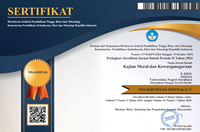Implementasi Pendidikan Karakter Melalui Sistem Full Day School di SMP Negeri 3 Blitar
DOI:
https://doi.org/10.26740/kmkn.v6n3.p%25pAbstrak
ABSTRAK
Penelitian ini bertujuan untuk mendeskripsikan nilai-nilai yang dikembangkan dalam pendidikan karakter di SMP Negeri 3 Blitar dan mendeskripsikan implementasi pendidikan karakter melalui sistem full day school di SMP Negeri 3 Blitar. Dalam penelitian ini menggunakan teori belajar sosal Albert Bandura dan teori behaviorisme Skinner. Metode dalam penelitian ini menggunakan pendekatan kualitatif dengan metode deskriptif. Penentuan informan penelitian dilakukan dengan cara purposive sampling. Dalam penelitian ini terdapat tiga informan penelitian, yaitu kepala sekolah SMP Negeri 3 Blitar, guru wali kelas VIII SMP Negeri 3 Blitar, dan siswa-siswi kelas VIII SMP Negeri 3 Blitar. Teknik untuk pengumpulan data menggunakan teknik wawancara, teknik observasi, dan teknik dokumentasi. Analisis data dilakukan dengan cara pengumpulan data, reduksi data, penyajian data, dan penarikan kesimpulan. Sedangkan untuk pengecekan keabsahan data menggunakan teknik-teknik meliputi validitas internal, validitas eksternal, realibilitas, dan objektivitas. Hasil penelitian ini menunjukkan bahwa, (1) Bentuk usaha sekolah dalam implementasi pendidikan karakter melalui sistem full day school yaitu melalui kegiatan ayo ngaji dan pendalaman keagamaan, ayo maca, ayo resik-resik, ayo basa, dan ayo kerja, Selain melalui kegiatan-kegiatan dalam program sistem full day school. Penanaman nilai-nilai karakter di SMP Negeri 3 Blitar juga menggunakan keteladanan atau memberikan contoh, teguran, kegiatan rutin, dan memasang poster-poster mengenai nilai-nilai karakter. (2) Nilai-nilai karakter yang diperoleh dari implementasi pendidikan karakter melalui sistem full day school di SMP Negeri 3 Blitar yaitu, nilai religi, nilai gemar membaca, nilai peduli lingkungan, nilai disiplin, dan nilai nasionalis.
Kata Kunci: Sistem full day school, pendidikan karakter, nilai-nilai karakter
This study aims to describe the values ??developed in character education in SMP Negeri 3 Blitar and describe the implementation of character education through a full day school system at SMP Negeri 3 Blitar. In this study using Albert Banduras sosal learning theory and Skinners behaviorism theory. The method in this study uses a qualitative approach with descriptive methods. Determination of research informants was done by purposive sampling. In this study there were three research informants, namely the principal of Blitar 3 Public Middle School, the VIII grade guardian teacher of Blitar 3 State Junior High School, and eighth grade students of Blitar Middle School 3.Techniques for collecting data using interview techniques, observation techniques, and documentation techniques. Data analysis was carried out by means of data collection, data reduction, data presentation, and conclusion drawing. Whereas for checking the validity of the data using techniques including internal validity, external validity, reliability, and objectivity.The results of this study indicate that, (1) The form of school business in the implementation of character education through the full day school system is through the activities of koran and as ayo ngaji program, ayo basa, ayo maca, ayo resik-resik, and ayo kerjo program, in addition to through activities in a full day school system program. Planting character values in SMP Blitar 3 also uses exemplary or exemplary examples, reprimands, routine activities, and installing posters about character values. (2) Character values obtained from the implementation of character education through a full day school system in Blitar State Junior High School 3 namely, religious values, value in reading, environmental care, discipline, and nationalist values.
Keywords: Full day school system, character building, character values
Unduhan
Unduhan
Diterbitkan
Cara Mengutip
Terbitan
Bagian
 Abstract views: 110
,
Abstract views: 110
, PDF Downloads: 152
PDF Downloads: 152





